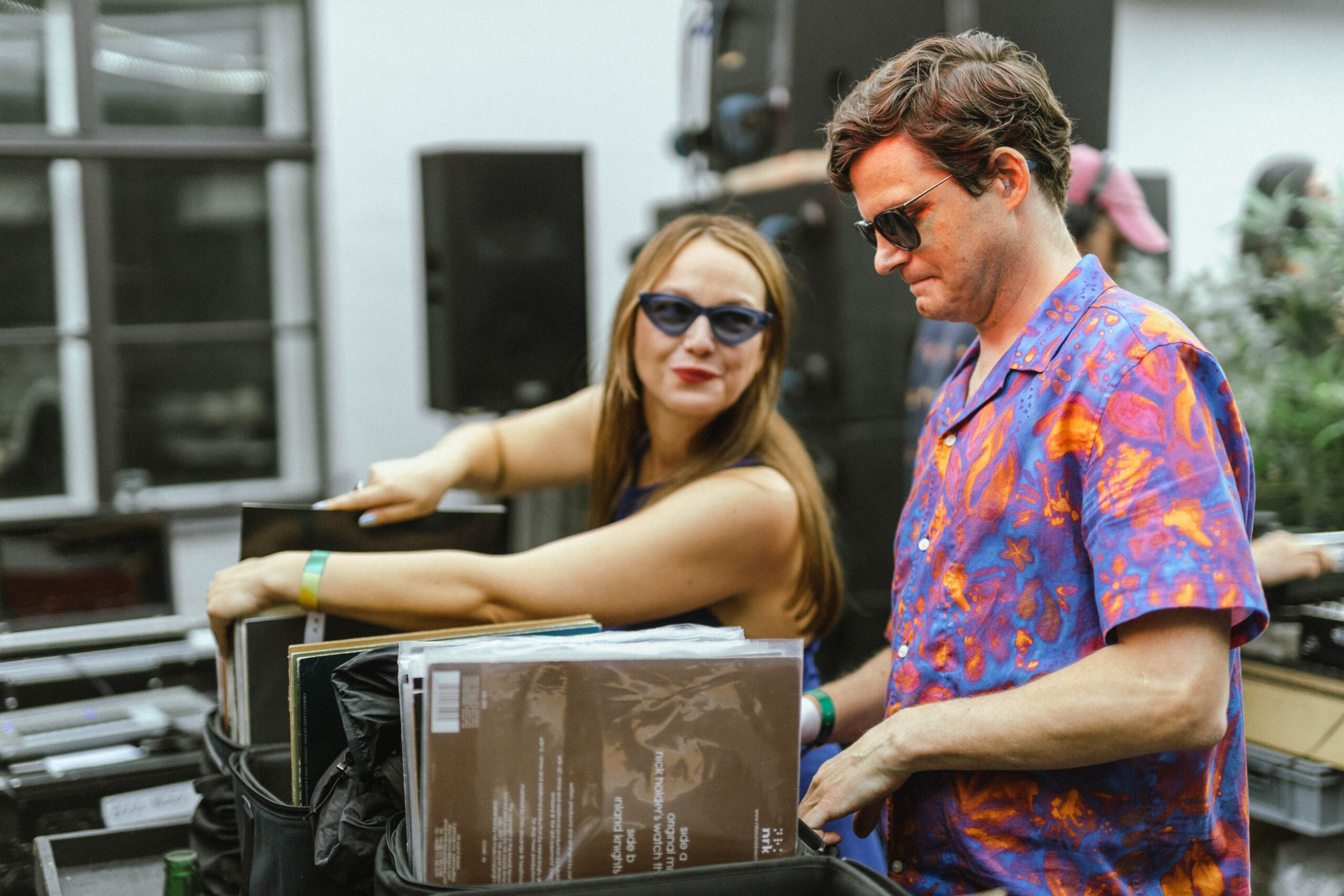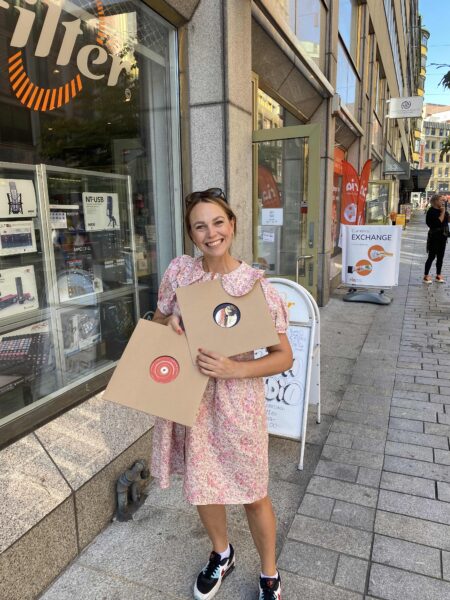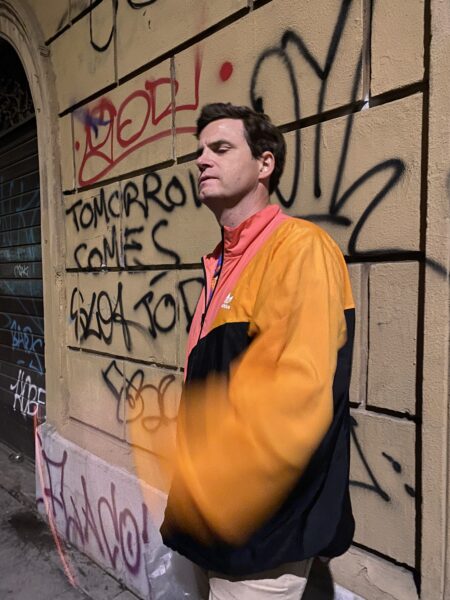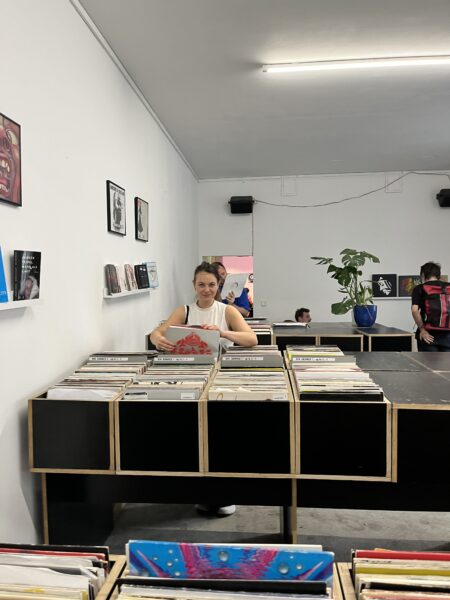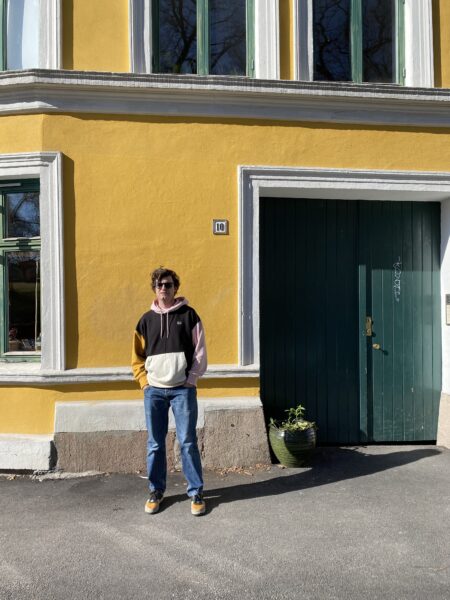We discuss Rub800’s new label Airbrush and his work alongside Tonchius as Ruton in a long chat with the DJ, producer and label pair.
Who gets to decide who’s playing the music? I always wonder when I meet these DJ couples that live and work together. Tonje says it’s more often quiet at home, and that would make sense. because Ruben (Rub800) and Tonye (Tonchius) are doing things a little differently.
The DJ, producer and label duo aren’t taking their cues from what anybody else is doing and together they’ve established a whole musical universe around their musical interests.
Their label, Continually has been releasing records exclusively on the vinyl format since 2020, with music featuring the artists from Romania to right here in Oslo. At the heart of it is their collaborative project, Ruton which launched the label, building on their own progressive minimalism and expanding as far as that Romanian sound.
As DJs, Rub800 and Tonchius are familiar figures around Oslo, and can often be found playing the likes of parties like UNTZ, Det Gode Seslakab, Moving Heads and club nights at places like VIlla. They are no strangers to Jaeger either.
With early informative experiences in 90’s Trance and Jazz, Rub800 and Tonchius have established themselves in a scene that has gathered around the extensive minimal expressions of Techno and House. An airy quality informs their music where melody infuses undulating rhythms. Whether combining their disparate influences as Ruton or working on their individual solo projects, under Continually it all informs a very distinct sound.
Expanding on that sound, they’ve established a new label called Airbrush as an exclusive vehicle for Rub800’s most recent creations. Another vinyl label with that same DIY approach that informs Continually, Airbrush expands on Ruton’s sonic universe as they set their sights on the future.
On a cold night in November, we found Ruben and Tonye on our couch at Jaeger to talk about their latest pursuits with Airbrush and filling in the blanks of their collective history together. We all meet up just before Ronya takes to the booth for her Jaeger Mix, which they’ll stay for later, but first we’ll have a chat as we sink into a sofa.
***Ruton plays Moving Heads in December
Tell me about this new label, Airbrush.
Ruben: I wanted to put out new music on my own. It’s a small label with mostly my own tracks, a low key do-it-yourself label. I also design the artwork on the sleeves.
And the new alias Sequent Consult, when did that happen?
R: Around the same time. It’s something that I came up with about a year and a half ago because I wanted a new alias for Airbrush. I bought a new sequencer so maybe it’s connected to that. (laughs)
Tonje: And you have other aliases as well.
R: Yes we (Ruben and Tonje) have the collaborative project Ruton. And we’ve released two records on Continually, the last one on the first one.
And Continually is your other label with Tonje.
R: Yes, Airbrush is just a small part of our musical universe.
T: I think it tricks people because it’s mostly just on vinyl. If you had to search it, it’s not the first thing that comes up.
So why start Airbrush?
R: With Continually, we wanted to release our friends and our own music, so I wanted a small side project with Airbrush, because I made a lot of tracks in the last few years. I wanted to express myself a little more in smaller batches and self-distribute these records.
Similar to the way Sex Tags do it.
R: Yes, that is some of my inspiration.
Why was vinyl your preferred format for both Airbrush and Continually?
R: I’ve always played vinyl and I prefer DJing with records.
T: It’s more of a cultural thing as well.
R: I’ve been doing this for 10-15 years, digging in record stores. If you start digging and collecting records, it’s a bit more work. You have to go to a physical record store, carry those records.
Did you have the music ready before the label?
R: I started to collect tracks that I liked and produced some more in a combination of tracks that work together.
Were there more tracks left off the EP?
R: Yes, of course. I thought about this side-label for a while, and then I started making tracks. Additional tracks based on these jams could be part of another EP, or VA, if it fits.
Continually is also exclusively a vinyl label, but it’s more inclusive in terms of the other artists featured on there.
T: The first one was us together. People started contacting us shortly after, mostly people from abroad; some friends, some friends of friends and complete strangers as well. That’s the idea to bring people together.
Have you had any people from Oslo on Continually yet?
T: The people that we have released are Slovenian, Italian and Dutch in addition to local producers A:G and Insectoscope (Matztam and Alex Jangle) which we have known for years and connected through Det Gode Selskab here in Oslo.
R: For the last five years, our music has overall been known more abroad than in Norway, but we’re very interested in local talent as well. I think since covid people in Oslo have shown more interest in our music with Continually and Airbrush.
I feel like I’ve seen more and more labels releasing on vinyl in Norway in recent years. Do you feel that more people are interested in local releases?
R: At least for some people. Many young people seem more interested.
T: People that only play digital will release stuff on vinyl too now, so I think there’s a general appreciation for a physical format.
Vinyl still does well in terms of sales. What is the market like for an independent releasing vinyl today? I know the delays are one thing but is it easier releasing vinyl these days?
T: I wouldn’t say it’s easy. We both have full-time day-jobs.
R: If you get the hype or a well-known DJ plays your record it could help.
T: In general the market for vinyl has grown.
People in Norway aren’t that exclusively interested in what Berlin is doing anymore?
R: I think so too, and I felt that more after covid. People are a bit more interested in their local scene.
T: That is what we’ve seen with Continually too. We want to release more Norwegian artists in the future.
Do you feel that there is anything like a scene contributing to all this here in Oslo?
T: It’s up and down like always, but I think people have to get older and we are older now. It’s more connected. People actually have to work together instead of just doing their own thing.
Yes, I find that it’s more fluid even in these disparate styles of music and concepts. There’s a lot of crossover happening even if the music doesn’t necessarily reflect it.
R: I can only speak for myself, but it’s about getting a bit older and more open to connect with other people and concepts that are different from what I do myself, and we still have some similarities.
T: We might have been looking abroad rather than in the city a few years ago, but now we see this is where we live so this is where we actually need to have a scene instead of looking somewhere else. We go to a lot of other concepts with music that we don’t necessarily appreciate ourselves, but we’ll still have a lot of similarities.
R: It’s important to be open to other genres and listen to something to which you are not that familiar. You can learn from it and enjoy some other people that inspire you.
What was your first connection with electronic music, Ruben?
R: I’m actually from Grimstad, (and still live part-time in the south of Norway.) There was nothing really going on there. I grew up listening to Trance. There were hyperstate CDs and Mixtapes and live from hyperstate on P3. I didn’t start DJing until 2005, when I bought turntables and started buying records, mostly from online stores like Juno.
It was always about records?
R: Yes, I have been fascinated with vinyl since around 1995. At that age, I had to watch DJs playing vinyl on television because I didn’t go to clubs.
Was it MTV?
R: Yes, some of that and also Viva.
Did you have anybody to play with or learn from in Grimstad.
R: Not until 2009, when I moved to Oslo and met some people from Oslo at Sunkissed, Blå. That was my first experience of the Oslo scene.
T: Back then you had this DJ community, (online.)
R: Yes, we had this Repeat forum, where you could chat, discuss mixes, post mixes and discuss tracks. It was a PLUR type of forum.
People posted events and such on there?
R: Exactly. It was really for Oslo, very local. That was around 2008 and it lasted for many years and then faded away when Facebook came. It was very welcoming and interesting for me, who was new to this electronic scene. I just liked electronic music.
Nobody taught you how to DJ?
R: No, I learnt everything myself. I just started with finding the pitch and practised that for many years. After many many hours you understand how the pitch works and you can find it without too much effort.
What were those first records you got from Juno?
R: It was kind of uplifting-Trance. Those old trance guys, from a period of ‘97 – ‘02. I was caught by this cheesy Trance wave.
All of it wasn’t that cheesy though. Those Sasha and Digweed global underground mixes still stand out?
R: I got into Sasha and Digweed after my cheesy period. That’s when I got into progressive Trance and Progressive House and then minimal and more weird music on the PLUR forum.
Were you also involved on the forum, Tonje?
T: I came in later. I met Ruben in Kristiansand actually. There wasn’t really a scene there, it was just them.
R: I met some students and they were also into electronic music, so we decided to have a concept on a monthly basis called UNTS. Kim Young iLL is running it in Oslo today.
T: And Ruben had a studio at Odderøya, which was a very good after-party place.
R: In Kristiansand, you actually have to close at 02:00, so we had to play a little bit more after that.
What changed for you to go from Djing at home to playing to a club
R: I felt there was something missing so I wanted to play in front of more people and enjoy it with other people. I got in contact with people in Kristiansand and then I was invited to play and it developed gradually.
T: It started off as home parties.
Because of the club situation in Grimstad and Kristiansand?
R: There’s nothing there. The first parties were just at home with other students and then we were asked to play in bars. It was mostly small bars. There’s no club community in Kristiansand. But we put on good parties.
All you need is a soundsystem and some people, right?
T: It was nice for someone like me who just got interested in club music, because I came from Jazz and classical music. I was looking for something else, and I really liked it. I was a bit embarrassed at first to say I liked electronic music. Kristiansand is so small, so it was really easy to find a place to listen to that kind of music on my own.
What were you doing in Kristiansand, Tonje?
T: I was studying in Kristiansand.
Were you studying at the conservatory there?
T: No, I considered it, but I realised you had to play many hours to become a professional, and I wasn’t that into the sound of the trombone. Then there was a natural progression to electronic music.
There was a lot of cross-over between jazz and electronic music for a time here.
T: Yes there was definitely a cross-over there with things like Punkt festival
R: Punk was vital as a contemporary music festival.
How did you get into making music, Ruben?
R: I like hardware and keyboards because I grew up with a father that brought various instruments home. I wanted to buy some synths and drum machines and give it a try to make some stuff on my own.
Did you have any musical training like Tonje?
R: I had some piano lessons when I was young, because my mother forced me. Using my own ear and creating melodies and rhythms just come naturally. I think a lot before I jam, but I try to think less when I’m in the process, when it’s just being creative and having fun.
When you say you think a lot. Do you have an idea about what a record will sound like before?
R: Sometimes yes. Certain records that were inspirational to me can be a starting point, but often it can be just the sound of a particular synthesizer or a sample or field recording. There are many angles in which to approach it.
Do you draw a line in the sand in terms of sound between your aliases?
R: The Sequent Consult is darker, more mystical and trip based. With Rub800 and Ruton it’s for the moment more Housey. Melody is the common thing between all of them. We are interested in melodies in various shapes.
There seems to be an airy quality to the first release on Airbrush from Sequent Consult, and that melody remains central.
R: That is something that I try to consider, especially for an EP. I want to have a path through the EP. It’s something like a small story. With Ruton and Continually we are more open, because we also did some Various artist releases. If we are combining other people’s tracks with our own, you have to find this match.
T: Also our style has moved in waves. When Ruben started it was more like this minimal Romanian style, and then going into House, Techno and Electro at some point. It’s constantly moving.
R: We are quite interested in many genres from IDM to downtempo to darker types of Techno.
Do you try to incorporate those elements into your own music and attempt to make records in those styles?
R: When I jam, I sometimes have a thought to make something in that style, but then it turns out to be the opposite of what I had in mind. Sometimes I’ll try to be more mystical and darker, but then it turns into a more positive euphoric jam. When I jam, I don’t want to stop and think too much. I want to go in one direction and finish it.
Tonje, you are a musician with some theoretical background. Does this come into play when you are working on electronic music, especially when you are working together as Ruton?
T: I started coming with this very theory approach, but it’s become just a jam.
You completely abandoned the theory.
T: I’ve forgotten a bit about the technical notes, but I still use a lot of chords and rhythms when I make music. That’s what music is about, arranging sounds into patterns.
R: It’s also about the sound. How it sounds is almost more important, with electronic music.
Are there plans for the second EP?
R: Yes, when I started the new label, I created 4 artworks. I called it Airbrush because I just sprayed some artwork quickly. I think the next release is coming soon. I just need to finish some more tracks. We’ll also do the next EP on Continually quite soon.
Together?
T: No, it would be most likely just me. I made some of these tracks 4 years ago and now I’m just adding two more. I am in the process of finishing it now.
R: And then it takes a while to get it mastered and pressed so probably it will only come out the middle of next year.
Do you guys still buy records to play?
T: Yes.
R: I buy records from Filter Musikk, Discogs, Juno etc, but I find myself buying a little less than some years ago. It’s still once or twice a month but not as many packages.
T: I think that’s because we are going to more 2nd hand shops. Every time we go to a new Country or a new city, we’ll visit the record stores.
And you’re still DJing often?
T: I would like to play more.
R: Yes, we’d both like to play more.

